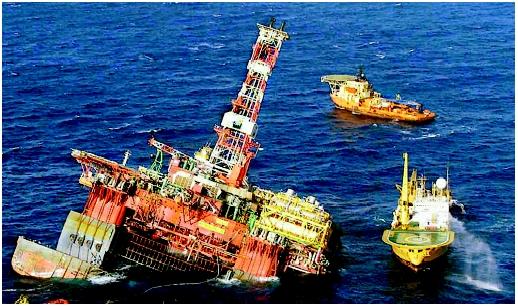The Scotsman
Well-Known Member
Exxon Valdez oil spill ruling overturned
Reuters | Thursday, 26 June 2008
The US Supreme Court has thrown out the record US$2.5 billion in punitive damages that Exxon Mobil Corp had been ordered to pay for the 1989 Exxon Valdez oil spill off Alaska, the nation's worst tanker spill.
By a 5-3 vote, the high court ruled that the punitive damages award should be slashed -- limited by the circumstances of the case to an amount equal to the total relevant compensatory damages of US$507.5 million.
The justices overturned a ruling by a US Court of Appeals that had awarded the record punitive damages to about 32,000 commercial fishermen, Alaska natives, property owners and others harmed by the nation's worst tanker spill.
In the majority opinion, Justice David Souter concluded the US$2.5 billion in punitive damages was excessive under federal maritime law, and should be cut to the amount of actual harm.
Soaring oil prices have propelled Exxon Mobil to previously unforeseen levels of profitability in recent years; the company posted earnings of US$40.6 billion in 2007.
It took Exxon Mobil just under two days to bring in US$2.5 billion in revenue during the first quarter of 2007.
The Exxon Valdez supertanker ran aground in Alaska's Prince William Sound in March 1989, spilling about 11 million gallons of crude oil.
The spill spread oil to more than 1,900 km of coastline, closed fisheries and killed thousands of marine mammals and hundreds of thousands of sea birds.
A federal jury in Alaska awarded US$5 billion in punitive damages in 1994. A federal judge later reduced the punitive damages to US$4.5 billion, and the appeals court further cut it to US$2.5 billion.
Exxon Mobil, the largest US company by market capitalization, then appealed to the Supreme Court, arguing it already had paid more than US$3.5 billion for the spill.
Souter rejected Exxon Mobil's argument that the federal clean water law's water pollution penalties pre-empt punitive damage awards in maritime spill cases. But he sided with the company in reducing the award.
"We ... hold that the federal statutory law does not bar a punitive award on top of damages for economic loss, but that the award here should be limited to an amount equal to compensatory damages," he said.
DISAPPOINTMENT IN ALASKA
In Alaska, Riki Ott, a fisherman and scientist and long-time environmental activist in the Prince William Sound town of Cordova, where most of the area's fishing fleet is concentrated, was disappointed by the ruling.
"We were really counting on punitive damages paying for our long-term losses in the fishery. That's obviously not going to happen," Ott said. "Well, that's an affront to everyone's sense of justice."
Tom Donohue, president of the US Chamber of Commerce, said: "This is good news for companies concerned about reining in excessive punitive damages." The business group said the ruling could have an impact far beyond federal maritime law.
John Passacantando, executive director of the environmental group Greenpeace USA, said the ruling "makes a mockery of justice" and added: "The worst environmental calamity in US history will continue to haunt the Prince William Sound and those dependent upon it for their livelihoods."
Company lawyers had called the US$2.5 billion the largest punitive damage award ever affirmed by a federal appellate court -- larger than the total of all punitive damage awards upheld by federal appellate courts in US history.
The case was decided by eight Supreme Court members. The ninth, Justice Samuel Alito, who owns Exxon Mobil stock, recused himself from the case.
Dissenting Justices John Paul Stevens, Ruth Bader Ginsburg and Stephen Breyer would have upheld the award. Stevens and Ginsburg said Congress, not the court, should set limits on punitive damages under maritime law.
Breyer said this was no ordinary reckless behaviour case.
RELAPSED ALCOHOLIC
"The jury could reasonably have believed that Exxon knowingly allowed a relapsed alcoholic repeatedly to pilot a vessel filled with millions of gallons of oil through waters that provided the livelihood for the many plaintiffs in this case," he said.
"Given that conduct, it was only a matter of time before a crash and spill like this occurred," Breyer said.
Exxon has not set aside any legal reserves for possible damages as the company has argued that it was not possible to predict the ultimate outcome. The ruling will likely take a small bite out of upcoming earnings.
Immediately after the ruling was announced, Exxon Mobil shares dropped around 80 cents, or just less than 1 per cent.
But the company's shares later recovered and were up 18 cents at US$87.10 each in early afternoon trading on the New York Stock Exchange.
The ruling could create a new public relations challenge for Exxon, which is already facing heat from Congress and consumers because of high gasoline prices.
"They are already being vilified in the news because of their profits," said Argus Research analyst Phil Weiss, who said the company's tenacious legal defence was good for its shareholders.
"But if I'm a consumer who doesn't own Exxon stock and doesn't care about Exxon stock, I'm looking at the money I'm paying to put gas in my tank and thinking 'Here they are, taking advantage of somebody else,'" Weiss said.
Okay Bunz specially for you! The award has originally set at $4.5Bn then on appeal went to $4Bn then back up to $4.5Bn then down to $2.5Bn now its on its way down to the lower court again for further review. The liability and negligence issue is not in dispute its the quantum of damages, thus the review by the Judges made according to US precident in Maritime Law....or at least that's the claim!
In any event its quite topical based on the fact that the US wants to expand its offshore drilling!


